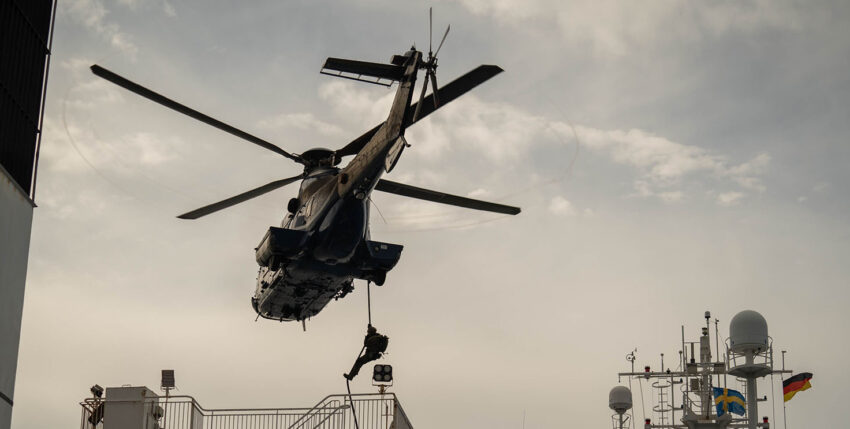Since Monday, 21 June 2021, the Federal Police have been practising the deployment and international cooperation of special forces in maritime emergencies. As in previous years, they were supported by the Federal Maritime and Hydrographic Agency (BSH). The challenge this year was a very special co-operation: in addition to the forces of the Federal Police, European special units of the ATLAS network from Finland, Denmark, the Netherlands, Belgium and Sweden were involved in the exercise scenario. The ATLAS network is an association of currently 38 specialised police units from EU member states and associated countries to improve cross-border cooperation, particularly in the field of counter-terrorism. Together with the GSG 9 of the Federal Police, the Federal Police Air Service and the Federal Police Sea, they practised for several days on the Baltic Sea north-east of Rügen. The GSG 9 of the Federal Police was responsible for conducting the exercise in close cooperation with the operational forces of the Expert Group (EG) Naval.
The exercise scenario involved training together with European partners on how to deal with a maritime threat situation in the event of a terrorist attack on board a ferry at sea. Due to their size, their radius of action, the helicopter landing deck, the possibility of accommodating special resources of the GSG 9 of the Federal Police and the management of the overall situation from on board, the new POTSDAM-class ships of the Federal Police fulfil the prerequisites for operating autonomously without shore-based support.
This meant that the GSG 9 task forces of the Federal Police were able to set off in parallel from the intervention vessels with multi-purpose boats and police helicopters, initiate the intervention and successfully deal with the dangerous situation. The international forces were also closely involved in dealing with the situation with their resources, ships from Finland and Sweden and a Finnish police helicopter, and various dangerous scenarios and their solutions were realistically simulated and practised on board the ferry. The presidents of the practising Federal Police Directorate 11 and Federal Police Directorate Bad Bramstedt as well as the commander of the GSG 9 of the Federal Police drew a positive conclusion.
"This year's ATLAS exercise was of considerable importance for expanding the maritime expertise of specialised police forces. Together with our international partners, we trained professionally and purposefully to combat terrorist attacks at sea. The exercise was a complete success. We have achieved our goal of increasing the efficiency of the units involved in the national and international network in dealing with special maritime situations. We are well positioned and will continue to professionalise ourselves," said President Olaf Lindner, Federal Police Directorate 11.
President Horst Kriesamer, Federal Police Headquarters Bad Bramstedt, adds: "The course of the exercise has shown that our joint efforts in recent months to deal with complex police situations at sea have borne fruit. We are on the right track. We will continue on it". Jerome Fuchs, Commander of GSG 9 and Head of EG Naval, emphasised the particular challenges of this exercise: "As we were working sea-based, communication was also of great importance. The task force ships, helicopters and multi-purpose boats had to be coordinated by a joint command element before and during the access phase. This operational procedure is considered one of the most physically and tactically demanding among the special forces. The Expert Group Naval has taken another step forward in its development, and I would like to express my sincere thanks to our European partners in the ATLAS network."
The Federal Maritime and Hydrographic Agency organised this year's SEAL UNITEX workshop on the ISPS Code on board the ferry. Due to the special nature of the involvement of European special units this year, one focus of the workshop was the optimisation of European cooperation in the area of maritime security. In addition, the shipping company's internal security systems were also subjected to a practical test. The aim was to develop, test and improve procedures for dealing with dangers in international maritime transport.
The basis for these exercises is an international agreement, the "International Ship and Port Facility Security Code - ISPS Code". The ISPS Code, which came into force after 11 September 2001, regulates access to ships and port facilities. The regulations are intended to prevent ships and port facilities from being targeted by terrorists or weaponised by terrorists. As the higher federal maritime authority, the BSH is responsible for implementing these regulations.
The BSH is responsible for checking the security systems on German seagoing vessels. On behalf of the Federal Ministry of Transport and Digital Infrastructure (BMVI), the BSH regularly organises exercises with different hazard scenarios. The Federal Police is responsible for the preparation, organisation and practical implementation of the specific exercise. The aim is to regularly review and continuously improve the protective measures for ships on the high seas. An administrative agreement between the Federal Police and the BSH from 2016 forms the basis for long-term cooperation with practical maritime security exercises.
Text & Photo: Federal Police










